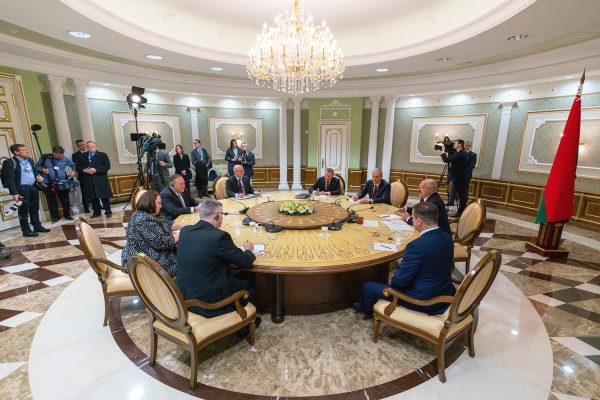
Tensions between Belarus and Russia prompted American secretary of state Mike Pompeo to pay Alexander Lukashenko a visit this weekend. He told the Belarusian leader that the United States could fulfill all of his country’s oil needs if he wants to become “independent” from Russia.
This shouldn’t be taken seriously. Besides the hypocrisy — how “independent” would Belarus be if it traded its dependence on Russia for a dependence on the United States? — it would be logistically and financially almost impossible for America to meet the complete oil needs of Russia’s closest ally.
Pompeo’s remarks do suggest America is willing to help Belarus from being absorbed by Russia. But how much can it really do?
Dependence
Given its historical links and geographical proximity to Russia, Belarus depends on its eastern neighbor in many ways.
Russia meets 80 percent of Belarus’ energy needs. It sells oil at a discount, allowing Belarus to benefit from reselling oil and oil products at a premium.
Nearly half of Belarus’ exports in goods go to Russia. In services, the figure is a quarter.
Belarus is also reliant on Russian capital. Although the overall volume of Russian investments in Belarus is modest, Russia controls key sectors of the economy: it has complete ownership of Gazprom Transgaz Belarus, 50 percent of the shares in Belarus’ mobile network operator and 42.5 percent of the shares in the Mozyr refinery, one of two in the country.
Lukashenko’s dilemma
Russia has been willing to use Belarus’ economic dependency for political gain.
Last month, it suspended oil shipments in a dispute over how to implement the 1999 union treaty, which calls for the merger of Belarus and Russia. Lukashenko is opposed to the idea.
Oil from Norway has helped make up the difference. American liquified natural gas could help, although it would be much more expensive to transit.
Reducing Belarus’ dependence on Russian oil and gas would only go so far, however. Russia would still have many other levers to pull.
Lukashenko is in between a rock and a hard place. He wants to stay in power, which means avoiding unification with Russia, but he needs Russian support, and the Russian market, to stay in power.
More than oil
Economic integration between Belarus and Russia is happening. The arguments for political unification will only grow stronger. So long as Lukashenko is in power, it is unlikely to happen, but the possibility cannot be discarded.
Pompeo will have to think of more than oil if he wants to help Lukashenko out of his political predicament.
